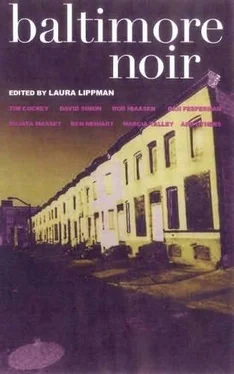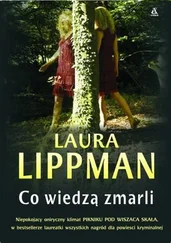Laura Lippman - Baltimore Noir
Здесь есть возможность читать онлайн «Laura Lippman - Baltimore Noir» весь текст электронной книги совершенно бесплатно (целиком полную версию без сокращений). В некоторых случаях можно слушать аудио, скачать через торрент в формате fb2 и присутствует краткое содержание. Жанр: Триллер, на английском языке. Описание произведения, (предисловие) а так же отзывы посетителей доступны на портале библиотеки ЛибКат.
- Название:Baltimore Noir
- Автор:
- Жанр:
- Год:неизвестен
- ISBN:нет данных
- Рейтинг книги:3 / 5. Голосов: 1
-
Избранное:Добавить в избранное
- Отзывы:
-
Ваша оценка:
- 60
- 1
- 2
- 3
- 4
- 5
Baltimore Noir: краткое содержание, описание и аннотация
Предлагаем к чтению аннотацию, описание, краткое содержание или предисловие (зависит от того, что написал сам автор книги «Baltimore Noir»). Если вы не нашли необходимую информацию о книге — напишите в комментариях, мы постараемся отыскать её.
Baltimore Noir — читать онлайн бесплатно полную книгу (весь текст) целиком
Ниже представлен текст книги, разбитый по страницам. Система сохранения места последней прочитанной страницы, позволяет с удобством читать онлайн бесплатно книгу «Baltimore Noir», без необходимости каждый раз заново искать на чём Вы остановились. Поставьте закладку, и сможете в любой момент перейти на страницу, на которой закончили чтение.
Интервал:
Закладка:
“Looking down that airy way, I started counting up all the lies I’d told and they rattled in my head like nickels in a bucket.”
When I told her I wasn’t a priest she just kept on talking, a truck whose breaks had given out.
“Then I was in Zeppie’s.”
“Zeppie’s?”
“Thames and Ann.”
Zeppie’s was a neighborhood tavern where stevedores and deckhands started the day with boiled eggs, raw eggs, egg sandwiches, a shot, and a beer; a Polack gin mill that made a mint on work gloves and sold soup and sandwiches to laborers who settled their tabs with stolen hams and transistor radios.
“George went there sometimes,” she said. “I wanted to have a drink with him. That’s something I’d never done.”
“But he was already…”
“Every now and then you could talk to George.”
Zeppie’s was stag, the only broads you’d find there were Sissy Z. behind the bar, wives looking for their husband’s pay, and the busted onions upon whom that hard-earned cash was spilled.
“I found a table in a corner where I didn’t think anyone would pay much attention.”
Someone did. A tugboat captain who’d just tied up over at the Recreation Pier looked through the crowd and saw Leini and nothing else. He was clean shaven-he’d just washed up on the boat and changed out of his work clothes-handsome and more than a couple years younger than her.
“He asked if he could sit down and then he was sitting down,” she said. “When I told him I was leaving, he turned to get me a beer and I was gone.”
Out the door and pushing home again, remembering not that she had betrayed George a million times but Orlo only once. It was getting late. There was a pig’s head on the stove to deal with.
“I still had the willies, only worse,” she said.
Some kind of stick in her back.
Denied passage with the clouds on its way out of this world, the condemned soul of George A. Papageorgious coursed along the crumbling curbs of Baltimore.
From the Lorraine Tavern, where Orlo saw a morgue wagon as he worried his own way home, the ghost hugged the mossy seawall of the harbor, knocked a beer into the lap of a dapper tugboat captain who thought he’d gotten lucky, and bent the tines of his daughter’s tongue as she put the family’s business in the street.
“It was the eyes that got me,” said Little Leini, sneaking out to a New Year’s party with a girl she thinks is her friend. “Like a couple of loogies hocked on the sidewalk.”
“You eat that stuff?”
“Hell no,” said Little Leini. “I don’t know who they think they’re fooling, but they ain’t fooling me.”
Not at all.
What remains of George tries to visit the graves of those he’d loved as best he could-a stone honoring the valor of the 29th Division, the tombs of a half-dozen others-and is turned back.
Yet it easily reaches the growling appetites of a couple whose fidelity to one another, something he knew but could never prove, had vexed him for decades.
Sliding up the side of the Salvage House and into the third-floor room where Orlo’s father had died, the vapor threw a tiny monkey wrench into every timepiece on the wall, guaranteeing that, for one night at least, the junkman and his slut will not be in sync.
Creeping away, it hovers above a patch of burnt dirt where Leini’s guardians once ran a moneymaker known as Ralph’s Lunch.
“It will be yours, George,” they’d told him, laying out the deal less than twenty-four hours after catching their young charge parading through the streets in a junk wagon.
The ghost snakes through the exhaust pipes of buses parked near the house where George was absent more than he was home, crosses the street, and hovers before the window of a kitchen where a low blue flame kept a pot of water bubbling around the scalded head of a pig.
Leini’s window looks down on row after row of pale green transit buses that have ferried her to many a meal across the arc of her heroic adultery.
The No. 23 to Irvington, where the junkman had openminded friends among the Xaverian missionaries who ran the orphanage at Transfiguration High; the No. 4 down to the scrap yards of Turner’s Station, which might as well have been Mississippi, entire fields of junk where Orlo commanded the respect of men who’d been born to it; and the No. 14 south to the strawberry patches of Anne Arundel County.
All behind Leini as she climbs the stairs and turns the key.
“The house was cold and empty,” she said. “I turned the heat up, checked the pot, and put water on for tea.”
“What about George… wanting to apologize?”
“It passed,” she said, the electric Magic Chef clock on the face of the stove humming close to the hour. “I kept my coat on and tried to read.”
“What?” I asked, making up questions now just to spend more time with her.
“Se-fah-rye-des,” she said, handing me a small green book with his name on it. “He just won the Nobel.”
“For?”
“Poetry,” she said. “Seferiades believes it begins in our breath.”
Old friend, what are you looking for? It is time to say our few words for tomorrow the soul sets sail…
The kettle whistled and she set the book aside, something rare and delicious about to take shape beneath her hands.
“I use every part of the pig but the squeal,” she said. “The recipe even sounds like a song.”
“How so?”
“When you skim away the fat from the broth, you’re not supposed to get rid of all of it. It says to leave ‘a little of the nicest.’”
“A little?”
“Of the nicest.”
Leini didn’t expect to get it all done right away. It was a recipe that required patience, and in the morning she’d listen to the bells of St. Nicholas and take her time picking through the bones, chopping the ears as fine as rice. Using some of the greasy broth to help bind the dish, she’d mix in black vinegar and broken peppercorns, pack the devil into a mold shaped like the head of a tusked boar, dust it with paprika, and slide the treat behind George’s beer at the back of the fridge to gel.
“We take turns trying to surprise each other with something special,” she said, imagining the pink treat sliced thin across hunks of black rye, moist enough to spare the condiment. She tries to picture the afternoon it might have garnished; which bus would have taken her there.
Near the stove, she reached through the thick mist of clove and onion and sea salt for a mug above the sink; pours the water, dunks the bag. Standing at the darkened window with tea between her hands, she lets the heat seep into her palms and considers her aging face reflected in the glass.
Neither poet nor teacher nor librarian, as she’d once hoped. Not so much a storyteller as one about whom stories are told.
Or much of anything-though it is said she is pretty good with a sewing machine-but a stubborn gourmand with a sandwich to spare and secrets leeching into the cobblestones of a city desperate to keep pace with progress.
“I never tried, really tried… to reverse the hesitation of my misery,” she whispered to the glass. “I always took the other way around.”
And with that thought, the window shattered and she was thrown across the room, hard against the wall.
“Can you describe who did it?”
“Something yanked me out of my coat like a shot from a sling,” she said, nodding to the wall behind me. “You can see the tea stained the wallpaper… It was midnight, they started shooting guns on the street.”
“Something?”
“I don’t know,” she said, wincing as she tried to itch her swollen nose, moving a tissue toward the cuts and bruises on her face and then pulling it away. “When I looked up, the pig head was dancing around the room like it was on stilts. It leered at me. I thought…”
Читать дальшеИнтервал:
Закладка:
Похожие книги на «Baltimore Noir»
Представляем Вашему вниманию похожие книги на «Baltimore Noir» списком для выбора. Мы отобрали схожую по названию и смыслу литературу в надежде предоставить читателям больше вариантов отыскать новые, интересные, ещё непрочитанные произведения.
Обсуждение, отзывы о книге «Baltimore Noir» и просто собственные мнения читателей. Оставьте ваши комментарии, напишите, что Вы думаете о произведении, его смысле или главных героях. Укажите что конкретно понравилось, а что нет, и почему Вы так считаете.












